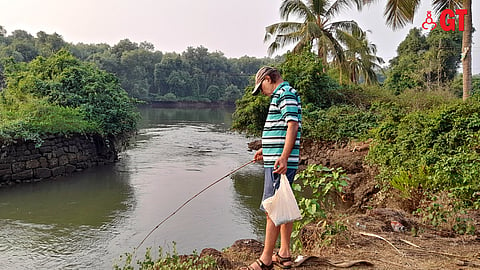

BY AUGUSTO RODRIGUES
Miscommunication seems to have left many Goans for whom fishing is a hobby in a net of confusion with Director of Fisheries Shamila Monteiro categorically stating that under the Goa Marine Fishing Regulation Act, “permission is needed for sport fishing and not for those for whom fishing is a hobby”.
“Since Goa is being sold as a tourist destination, we thought my getting sport fishing registered, would be an opportunity for Goans to register and start selling sport fishing as another activity,” Shamila Monteiro told Gomantak Times Digital.
“All those in the tourism industry can now sell sport fishing professionally,” said Shamila while adding that the registration mandated was not new and that the fees have been revised from 1981.
“I read the notification and it was clear that the fees were being revised. I think it was you all in the media who didn’t seem to understand the notification and tried to make a hue and cry about it,” said Albert Lobo, as he pulled in a mullet near a sluice gate in Ribandar with a bamboo fishing rod.
“It is called sport fishing when one uses a rod with fishing equipment and other professional fishing paraphernalia. It’s a hobby when someone fishes with his fingers or uses a bamboo stick to navigate the line,” explained Shamila, who claimed she was surprised by the public reaction to the amendments.
Fees for a fishing license were first set in 1981 when fifty paise was charged to fish with a set of hooks.
The first amendment to the 1981 rules was in 1993 when the rate to fish with a net of hooks was revised to Rs 15. Now, under the Goa Marine Fishing Regulation 1982 Act, it has been revised to Rs 100.
The Fisheries Department of Goa initially followed the Indian Fisheries Act, 1897, which was later amended to Goa, Daman and Diu Fisheries Rule, 1981, and is now the Goa Marine Fishing Regulation 1982.
“I got my license a few years back, but I forgot to renew it. According to the rules, people are not supposed to catch fish with nets on the banks of the River Mandovi, from Miramar to Panjim, to allow us anglers to fish,” admitted Andrew, who occasionally hires a boat to go fishing out at sea.
“When one goes sport fishing, one is supposed to throw the fish caught back into the water. Sport fishing is a big draw in the north and other parts of India and I am sure by getting a license for sport fishing, stakeholders in the tourism industry will stand to gain,” explained Shamila.
As of today, there are 12 sport fishing vessels registered with the Department of Fisheries; 278 non-motorised canoes; 1855 motorised canoes; 40 trawlers; 329 purse seiners; and 64 trawlers cum purse seiners.
The police have no jurisdiction to apprehend anyone fishing without a license. That is the jurisdiction of people from the Department of Fisheries and the Coast Guard.
Some states in India have their own fish rangers,” admitted Shamila while affirming that people fishing with traditional equipment have nothing to fear.
“I have been taking foreigners fishing and the British are my main clients. I have started getting Indian clients, but most of my clients are foreigners. They like to go out fishing and having a good time with some beers whilst doing so,” admits Joseph from Nerul, who has been sport fishing for a while.
“Licenses are mandatory in most countries or at least in the UK where I live. When I come home to Goa, we at least are able to enjoy the fish we catch. The same is not true abroad. In one way we want to imitate the West, and we get upset when rules are brought into place to streamline activities. This is where we fail,” said Irineu, as he sat angling in Nerul on a visit to his home, Goa.
The new revision in fees announced by the government, if anything, explained how little knowledge can be dangerous.